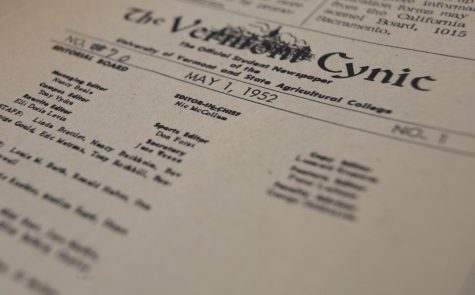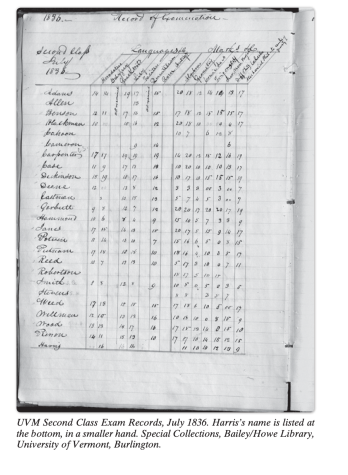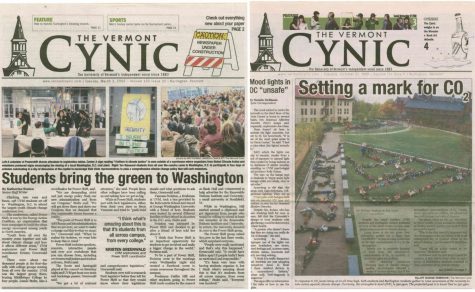Budget system switch for UVM
Following the examples of peer institutions like the university systems of Delaware and Michigan, UVM is making a major move to directly link its resources with the strategic plans of the University’s colleges and schools.
The new budgeting system, called Incentive Based Budgeting (IBB), would encourage departments to find new ways to bring in revenue and boost student retention, while also allowing them to keep part of what they bring in, said Provost David Rosowsky, who joined UVM’s administration in August.
“We are trying to empower the colleges and schools to develop and manage their resources strategically and efficiently,” Rosowsky said. “We are not looking for or trying to single out departments that are failing.”
Under the current system, the Office of the Provost distributes the funds that come in through tuition revenue, state appropriations and grants to each academic department. With IBB, if a college makes a profit it could essentially retain the majority of that money.
Student Government Association (SGA) President Connor Daley said this would likely cause UVM’s 12 colleges and schools to become more competitive.
“There is a sense of ardent complacency,” Daley said. “The deans have no responsibility to perform.”
The push for a new budgeting model comes at a time when the University, like most universities in the U.S., is struggling to combat financial challenges while also maintaining to keep a college education affordable.
President Tom Sullivan addressed these issues Oct. 7 when he sent out a campus-wide email about UVM’s proactive approach to the FY15 budget and beyond, a conversation that typically does not happen until the spring, Daley said.
Lower out-of-state enrollment numbers and higher-than-expected financial aid need left UVM with a $5.8 million budget shortfall this summer that was covered by board of trustees-approved one-time funds, the Cynic reported in September.
Administrators predict UVM will likely face another budget shortfall this year, and the fact that the University receives a minimal amount of funding from the state means that it has to find new ways to boost profit. A new budgeting system like IBB would encourage more entrepreneurship and innovation at the level of individual colleges, Rosowsky said.
“Some colleges may choose to offer market-driven masters degree programs, others may choose to offer executive education programs,” he said. “Some may choose to run summer institutes, others may choose to create certificate programs. The list goes on.”
But while IBB may sound like a good idea fiscally, in practice-effectively forcing some departments to improve at the potential expense of others- it brings up serious questions about its implementation, namely, what would be the criterion for gauging the financial success of an individual college?
Daley said budgeting based on the headcount enrollment, student retention and the number of student credit hours per college are all being considered.
“Figuring the money based only on majors would be retroactive and unfeasible,” he said, adding that there are factors such as the cost of instruction (for instance, an engineering course costs more to teach than an English class) and fluid enrollment that need to be addressed.
Then there is the problem of administrative costs, which under the current system are skimmed off the top of incoming funds automatically. Colleges would likely share the cost of running and maintaining the libraries, buildings and grounds on campus, Daley said.
For example, if students in the College of Arts and Sciences needed to use Morrill Hall after normal classroom hours, that college would expect to shoulder most of the cost of keeping the electricity on and the building open, he explained.
He said that what concerns him most is that certain colleges and departments may have more resources to attract students to certain majors while others could get sidelined. Student input will be critical to IBB’s implementation at UVM, the first university to ask for student opinion in this process, he said.
“It is important for students to be involved,” he said. “The major risk of IBB is incompletely informed students. Forty percent of the incoming class this year came in undeclared. How do you account for that?”
Film and Television Studies department chair David Jenneman said that already different academic departments use different financing models, and that IBB should address this.
“A high-end STEM grant is greater by a factor of 10 than a high-end humanities grant,” he said. “I hope that IBB takes a lot of variables into account in how money is allocated.”
There will be several open forums and meetings over the next few months to allow faculty, staff and students to weigh in on the new budgeting model. Daley said the administration is committed to implementing IBB by July 1, 2014, but that the first year would likely be a baseline year to make adjustments.
Ultimately, administrators like Rosowsky are optimistic of IBB’s effectiveness.
“Competition for students is healthy,” he said. “It’s good for students. IBB keeps our focus on our highest goals: access and affordability, academic quality, preparing our graduates to be successful, and a four-year undergraduate degree.”










